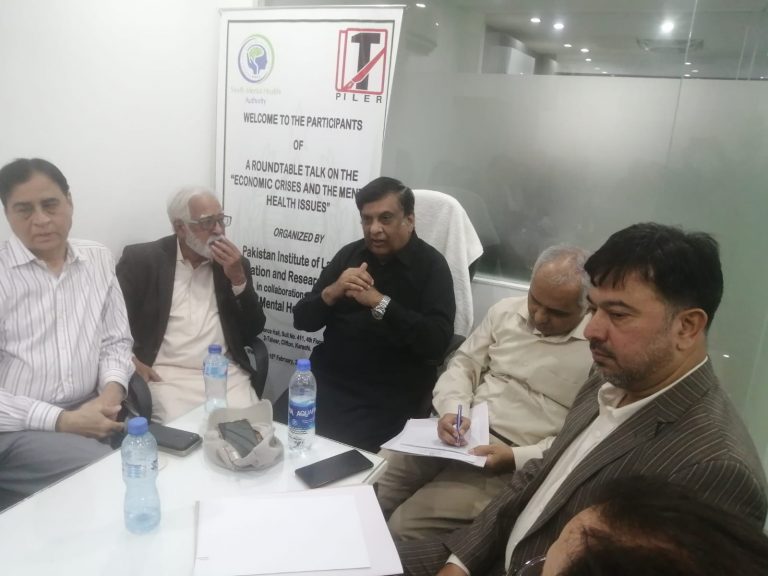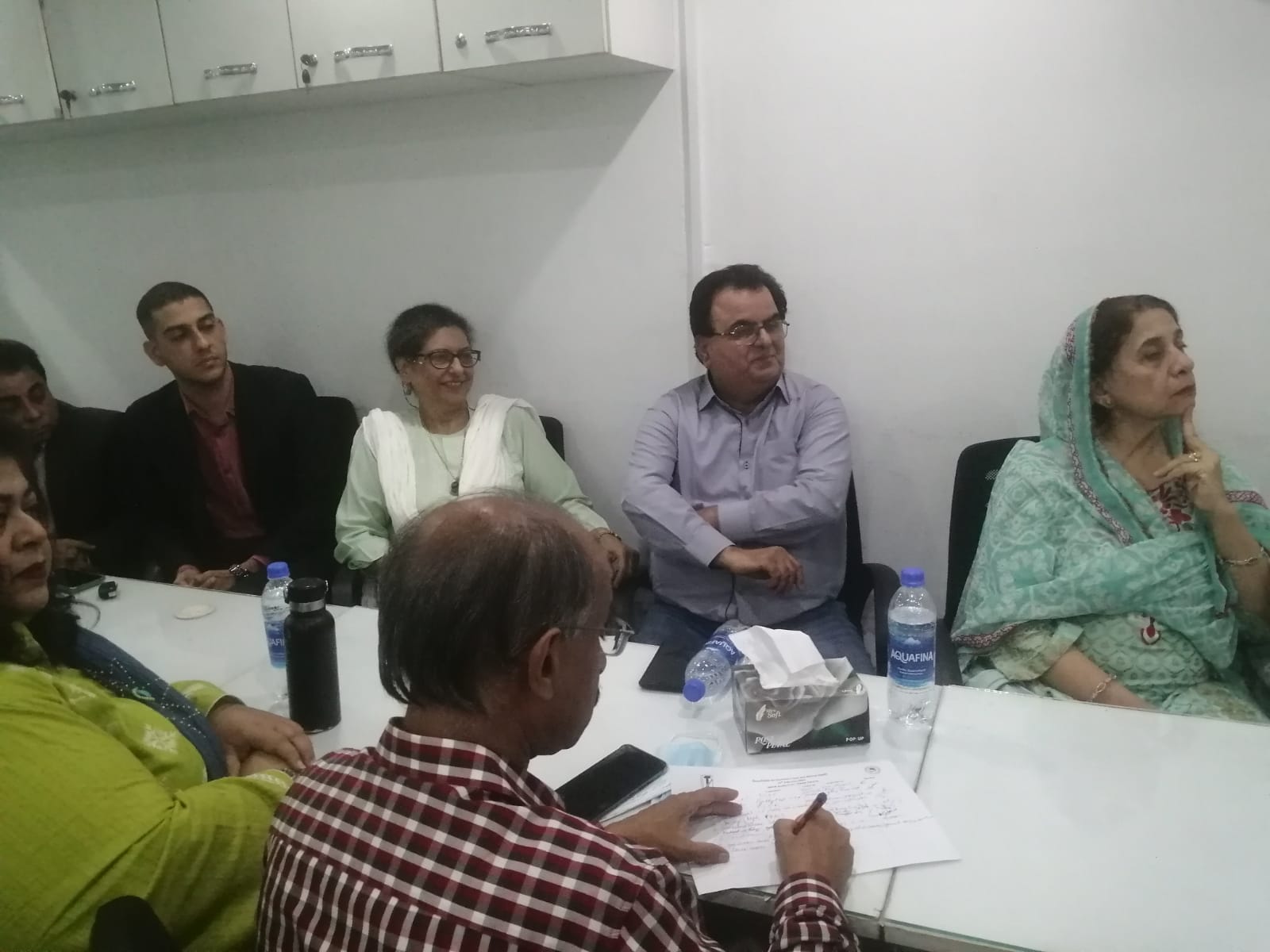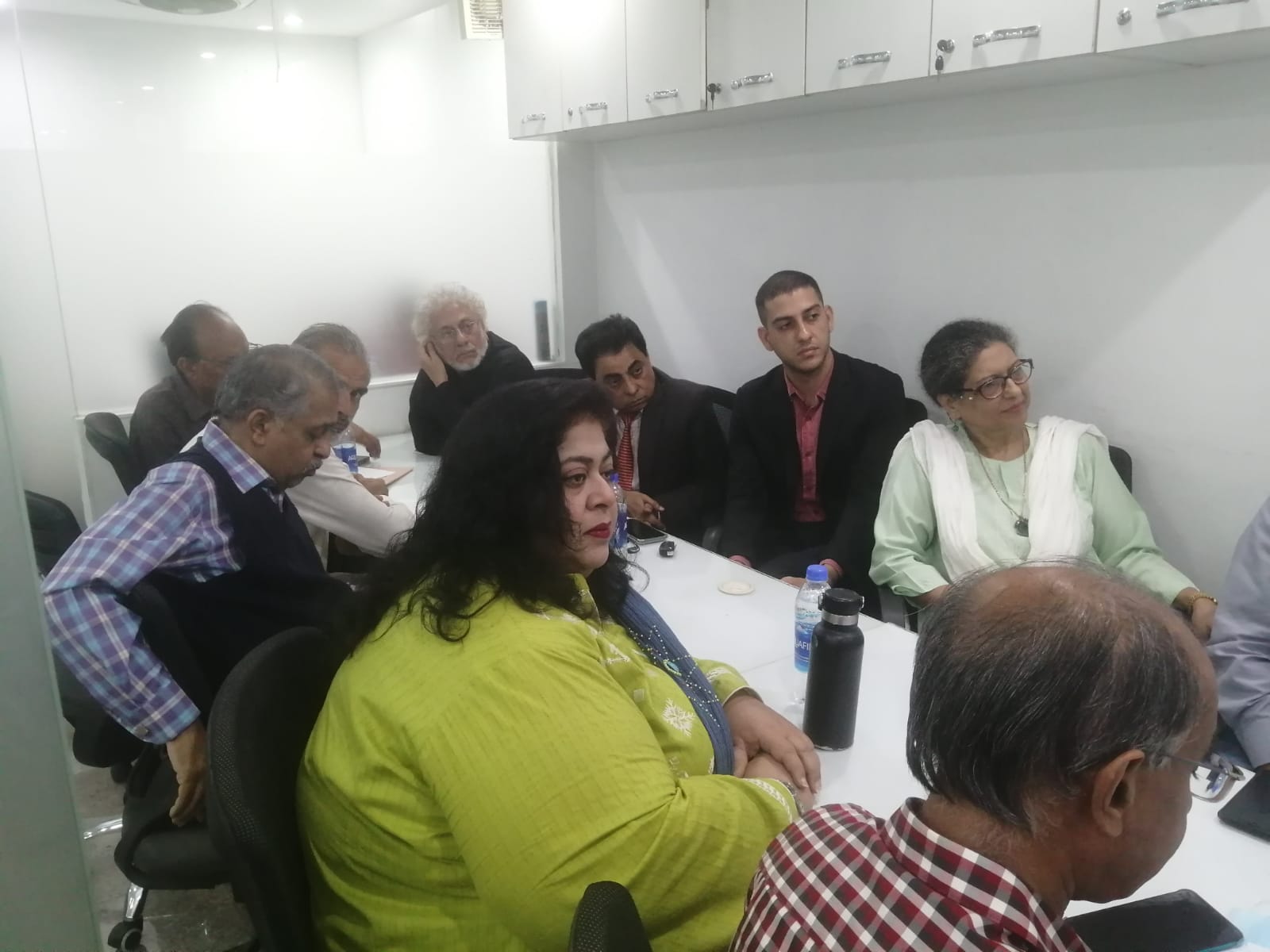
Pakistan Institute of Labor Education and Research, in Collaboration with Sindh Mental Health Authority organizes the Roundtable Talk on “Economic Crises and the Mental Health issues”
various hypotheses that suggest that the increasing mental illnesses might give way to anarchy
Sindh Courier Report
Karachi
The speakers at a roundtable conference on Wednesday noted with grave concern that the depression and other kinds of mental illness are on the rise across the country owing to various factors including economic crises, being the main factor.
Pakistan Institute of Labor Education and Research (PILER), in Collaboration with Sindh Mental Health Authority had organized the Roundtable Talk regarding “Economic Crises and the Mental Health issues” at SMHA office Karachi.
Senator Dr. Karim Ahmed Khawaja, Chairman Sindh Mental Health Authority and Karamat Ali, Executive Director PILER, Dr. Riaz Ahmed Shaikh, Acting Director, PILER participated as Key Speakers.
“The level of prevalence of depression among the masses, which had risen to 40 percent during the years of Covid-19, would further increase due the economic crises,” Dr. Karim Khawaja viewed adding that there are various hypotheses that suggest that the increasing mental illnesses might give way to anarchy.
 “The people might resort to anarchy in different ways,” he said referring to rise in economic crises that followed the outbreak of plague in Europe resulting in violence against women, incidents of witch-hunting and setting ablaze the people etc.
“The people might resort to anarchy in different ways,” he said referring to rise in economic crises that followed the outbreak of plague in Europe resulting in violence against women, incidents of witch-hunting and setting ablaze the people etc.
“Similar situation prevailed during the military rule of General Zia in Pakistan when the incidents of violence against women and children at home had increased manifold,” he said.
“We can observe such situation even today. The people are being stoned to death, they are being burnt alive and lynched on false allegations of blasphemy. There has also been rise in cases of torture on women.”
Dr. Karim Khawaja said that prevalence of mental illnesses shoot up when the society is overwhelmed by fascism, repression, and economic crises. “In such a situation, a particular section of society falls victim to it, like the Jews who became the target of Holocaust in Germany during the WWI,” he said.
“This is what we are seeing today in Pakistan also,” he said.
 Dr. Maqbool Memon, DHO Malir, Dr. Ali Wasif, President, PAMH, Dr. Chooni Lal, In-charge Department of Psychiatry JPMC, Dr. Suresh Kumar, Ex-Secretary Health, Prof. Dr. Farha Iqbal, University of Karachi, Prof. Dr. Qudsia Tariq, University of Karachi, Adv. Riaz Hussain Baloch, SZABLC Malir, Dr. Syed Zafar Mehdi, Secretary SMHA, Ms. Zahra Javed Naqvi, Head of Psychiatry Department, Shaheed Mohtarma Benazir Bhutto Institute of Trauma, Ms. Uzma Noorani, HRCP/WAF, Faris Ali Mughal, ICP, Dr. Ajmal Mughal, Consultant Psychiatry, M. Tehseen, South Asia Partnership Pakistan, Lahore, Mehboob ur Rehman, All Pakistan Federation of Trade Union (Wapda), Dr. Sohail Sehto, Radiologist, Saeed Baloch, Pakistan Fisher-Folk Forum, Ms. Malka Khan, Aurat Foundation, Ms. Mahnaz Rahman, Executive Director, Aurat Foundation, Ms. Zareen Rafi, Human rights Activist (PILER), Muqadar Zaman, Railway Workers Union, Abbas Hyder, Project Manager, PILER, Khadim Hussain, Admn Officer (PILER), Irshaq Soomro (SSSF), Ayoub Shan, Founding Member, Pakistan Fisher-Folk Forum, Jannat Hussain, Pakistan Trade Union Defense Campaign and others participated in Roundtable discussion.
Dr. Maqbool Memon, DHO Malir, Dr. Ali Wasif, President, PAMH, Dr. Chooni Lal, In-charge Department of Psychiatry JPMC, Dr. Suresh Kumar, Ex-Secretary Health, Prof. Dr. Farha Iqbal, University of Karachi, Prof. Dr. Qudsia Tariq, University of Karachi, Adv. Riaz Hussain Baloch, SZABLC Malir, Dr. Syed Zafar Mehdi, Secretary SMHA, Ms. Zahra Javed Naqvi, Head of Psychiatry Department, Shaheed Mohtarma Benazir Bhutto Institute of Trauma, Ms. Uzma Noorani, HRCP/WAF, Faris Ali Mughal, ICP, Dr. Ajmal Mughal, Consultant Psychiatry, M. Tehseen, South Asia Partnership Pakistan, Lahore, Mehboob ur Rehman, All Pakistan Federation of Trade Union (Wapda), Dr. Sohail Sehto, Radiologist, Saeed Baloch, Pakistan Fisher-Folk Forum, Ms. Malka Khan, Aurat Foundation, Ms. Mahnaz Rahman, Executive Director, Aurat Foundation, Ms. Zareen Rafi, Human rights Activist (PILER), Muqadar Zaman, Railway Workers Union, Abbas Hyder, Project Manager, PILER, Khadim Hussain, Admn Officer (PILER), Irshaq Soomro (SSSF), Ayoub Shan, Founding Member, Pakistan Fisher-Folk Forum, Jannat Hussain, Pakistan Trade Union Defense Campaign and others participated in Roundtable discussion.
Almost all the participants of roundtable were unanimous in stressing the government to take concrete measures for steering the country and the masses out of economic crises.
_________________